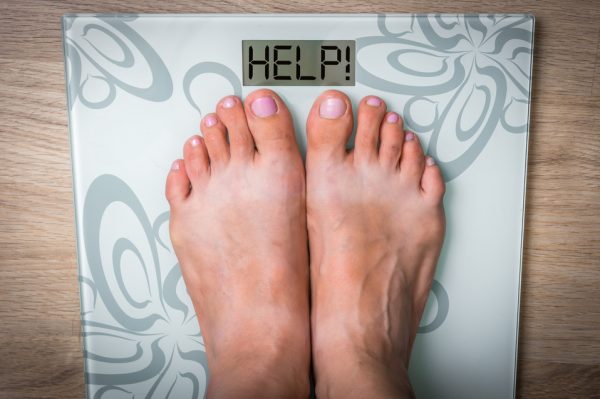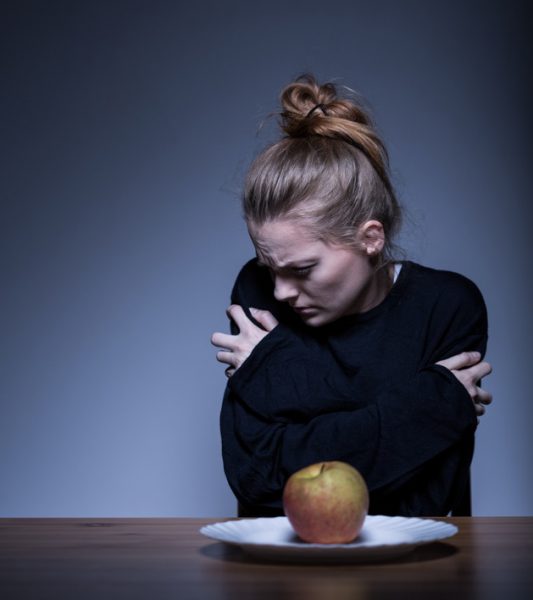
Zoe’s story
Zoe went on her first diet at the age of 12. Not that she needed to lose weight. She was just afraid she might gain too much. “I was terrified of being fat,” she explained. “Fat was not an ok thing to be in my family.”
By the time she was 15, she was eating massive quantities of food and then forcing herself to throw up. “That was back in the 60s before it had a name,” she said. “Before I knew it was something people did. I just discovered this thing and I thought it was magic.” The name for it today is bulimia.
Zoe was able to keep it a secret even when she got married. “You’re masterful at keeping secrets,” she said. “When I first got married, we not only lived in an apartment with one bathroom, but he and I also shared an office space with one bathroom and for the first year of our marriage he did not know.”
When she finally told her husband, she thought she had everything under control and that her issues with food were behind her. It didn’t take long for things to start up again and continue. “I’m five, two and a half,” she told me. “I’ve weighed as much as 165 and I’ve weighed as little as 95. I was bulimic for many, many years, so my disease manifested more as one of control. I did lots and lots of things to control my weight.”
What happened to Alex
Alex has a different relationship with food. When she graduated from high school she weighed 180 pounds. Acceptable for a young woman who is 5’8” tall. She was in the 200s in her 20s and kept on gaining in her 30s. “I got divorced when my daughter was four,” she said. “He just walked out and that’s where the food really came in. I gained 100 pounds from the time my daughter was two to ten, so in eight years, I gained 100 pounds. It was the pain and I didn’t know the solution.”
Finding recovery
Today, Zoe and Alex believe they have found the solution. Food Addicts in Recovery Anonymous or FA. FA is a recovery program based on the 12 steps of Alcoholics Anonymous (AA). Anonymity is one of its traditions, so Zoe and Alex are assumed names.
The women were both familiar with a 12-step program because they are also recovering alcoholics and members of AA. Alex, who is is in her late 50s has been sober since 1994. In 1999, when she was still struggling with her weight, she attended her first FA meeting.
“What happened to me,” she said, “was when I walked into the room I felt such hope. There were six people sitting there maybe eight and they were all right-sized bodies. They were smiling, happy. I said, wow, where am I?”
Alex was given a food plan — three weighed and measured meals a day with no flour or sugar. She got a sponsor. She attended regular meetings where people shared their stories and supported one another. Her life took on a new structure and new meaning.
“To me,” she said, “food addiction is an obsession and a compulsion. It’s a physical, mental and spiritual disease. It affects me physically with weight and mentally. I was very angry and full of rage. I’m not that way today. This program is not a religious program, it’s very spiritual. I have a higher power today, somebody to go to and wake up to in the morning and ask for help. This program has certain tools that I work every day.”
Zoe, who is in her 60s and now retired, stumbled upon FA through a friend. At the time, she was 15 pounds underweight and thought she didn’t need a program like that. But the more she thought about it the more she realized how obsessed she was about food. And that she had no peace.
“It’s the same as alcoholism,” she explained. “I also come from AA and when I take a drink of alcohol, all bets are off. I’ve lost control. I’ve given up control and the same thing with food. For me, it isn’t certain kinds of food, it’s just any food. I would binge. Your sponsor works out your food plan. You don’t figure that out for yourself. Because we clearly haven’t been able to figure out food stuff for ourselves or we wouldn’t need to be in this program.”
When you’re addicted to food in any way, say both women, it means you’re powerless. It doesn’t mean you have to stay addicted and you don’t have to do it alone. “What I love about FA,” said Alex, “is we don’t speak until we have 90 days of abstinence and we don’t sponsor until we have six months so it’s a real solid recovery. And we do service. We take phone calls, reach out, support one another. The fellowship is second to none. People are right there for you, no matter what’s going on in your life, there’s always a fellow who’s been through it and can help you.”
“You grow and you change in this program,” added Zoe. “I was in lots and lots of therapy throughout my life and I don’t pooh-pooh therapy at all. I learned a lot about me, about my family, my place in the family. It was all very interesting. It didn’t change anything. By taking certain actions in this program that we all support, I’ve changed. Nobody understands me like another food addict.”
Upcoming information sessions
Saturday, January 12, 2019
2:00 to 3:30 pm
Mid Coast Hospital
121 Medical Center Drive
Brunswick, Maine
Conference Rooms 1 & 2
(Snow date Saturday, January 19, 2019)
Saturday, January 26, 2019
2:00 to 3:30
Westbrook Housing Authority Administration Building
30 Liza Harmon Drive
Westbrook, Maine
(Snow date February 2, 2019)
These sessions are free and open to the public
Where to learn more about FA
For more information and to find out where there are meetings in your area, visit the FA website. By the way, there are meetings worldwide.
To speak with someone at the FA national office, call 781-932-6300.
If you think you might have a food addiction but aren’t sure, FA has a list of questions on its website: Am I a Food Addict?
In Maine, call 207-775-2132 for more information.



haha. the story about food addiction had an ad for weight loss reduction at the bottom! just thought i’d let you know, in case you can change it.
Hi Joy. Thank you! It’s not really an ad. It’s promoting a series I did several years ago about a woman who struggled with her weight and decided to have the surgery. When I publish something new, WordPress automatically selects what is considers to be related posts to promote.
By the way, she is doing well and staying healthy.